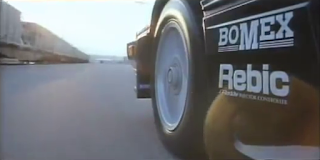Shuto Kousoku Trial; or, Whatever It Takes
A professional driver must have luck too apart from skill.
If you’re lucky, you get sponsors, skill alone won’t get you the chance to
race. Luck, skill, and money for racing. I have none of that! If I can’t beat 5’13”,
I should just forget it!
Today, I would like to review a movie that was purposely
pushed into the abyss of cinematic non-existence, placed at the bottom of the
straight-to-video heap by censors who hoped that it will become forgotten in
time. I’m talking about Shuto Kousoku Trial (a.k.a. Megalopolis Expressway Trial) from 1988. The first live action movie that focused on the
controversial subject of illegal highway racing in Japan, way before the
development of The Fast and the Furious franchise.
Release Info
Directed by: Katsuji Kanazawa Starring: Gitan Otsuru, Yumiko Masuzaki, Toru Sakai
Language: Japanese Original Title: 首都高速トライアル Runtime: 95 min
Synopsis
Rokuoo (Gitan Otsuru) is a young and ambitious driver who
aspires to become a professional F1 racer. In order to achieve his dream,
Rokuoo, together with his girlfriend Yoshiko (Yumiko Masuzaki) and mechanic
Yuji (Toru Sakai), attempts to break the time records set on national highways
by a famous racer Nakajima. With a specially modified Nissan Skyline R-30,
Rokuoo quickly starts setting new records one by one. Friends cheer for the
rising champion, but there’s one road which he dreads the most: the 13,9 km
track on Shuto Expressway which Nakajima beat in 5 minutes and 13 seconds.
“To hell with heroes! To hell with Shuto!”
I became aware of the Shuto Kousoku Trial series quite
accidentally when I saw a fan music video with Meiko Nakahara’s song
superimposed on the awesome racing clips. I started searching for the source of
these scenes and that’s how I discovered the series. The first movie was made
at the height of the street racing era in Japan and the popularity of Mid Night
Club. Although it was intended for a theatrical release, it was ultimately
banned by the authorities due to alleged promotion of illegal racing.
Nevertheless the movie was successful on home video and Toei Company Ltd.
commissioned direct-to-video sequels to be made.
The information on the making and history of the series is
scarce and mostly outlined by motorisation fans. All I managed to find out was
that the sequels were received warmly by the authorities as the pro-illegal
racing message was toned down and a professional racer Keiichi Tsuchiya
was brought on board in the supporting role. Shuto Kousoku Trial is also considered
to be not only the first series about racing, but also the one which has influenced
Initial D and Wangan Midnight manga series (and The Fast and the Furious as
well!).
However, all of this stemmed from the first movie, which can
now be perceived as an underrated 80s classic. It has the heart and passion due
to its story, interesting characters, and unforgettable racing scenes. In
addition, the implementation of rock instrumentals and City Pop soundtrack
also significantly adds to the viewing experience. The movie was banned for
advocating illegal racing, but, ironically, it is the only one in the whole
series to feature a police chase!
Honestly, I did not find the movie to be pro-illegal at all.
It is an engaging story about a driver coming to terms with his fears and
sacrifices he had made. The movie also touches upon the themes of friendship
and love for the road while objectively depicting the exclusive circle of
street racers. In the end, it’s all about making a successful trial run,
overtaking the Ajima bend, and losing the heat. That’s what kept me on the edge
of my seat.
Gitan Otsuru is excellent as Rokuoo, the first driver of the
series, and his performance is backed by a brilliant supporting role of Yumiko
Masuzaki. Additionally, Toru Sakai is great as a know-it-all mechanic. Additionally,
Ryo Kinomoto comes to notice as crazy police officer, Kawakita, who is determined
to put the racer behind bars.
Recommendations
If you like racing, you will definitely love Shuto Kousoku
Trial. Grab some snacks and relax during the 95-minute long spectacle of incredible
speed. I will definitely review the sequels, but I have to think in which form
(one review or each separately). As for the first movie, I’m glad that I came
across it. I will frequently sit back and enjoy its ride. Feel the force of
Skyline R-30, feel the nostalgia for the 1980s and; most importantly, feel the
power of Shuto Express!
Overall score: 9/10








No comments:
Post a Comment
Comment moderation is switched on due to recent spam postings.